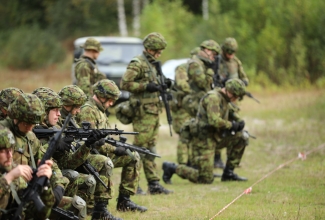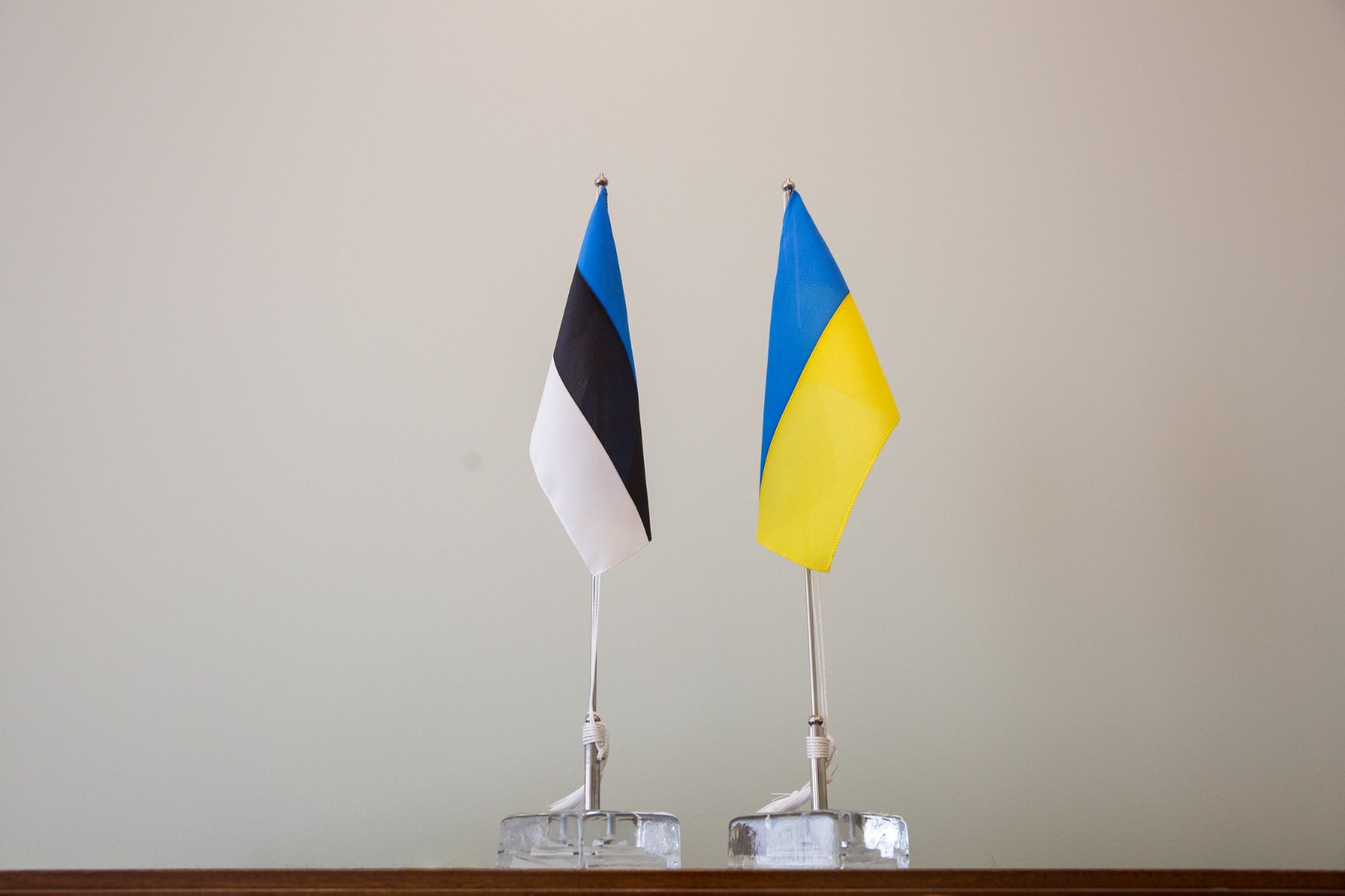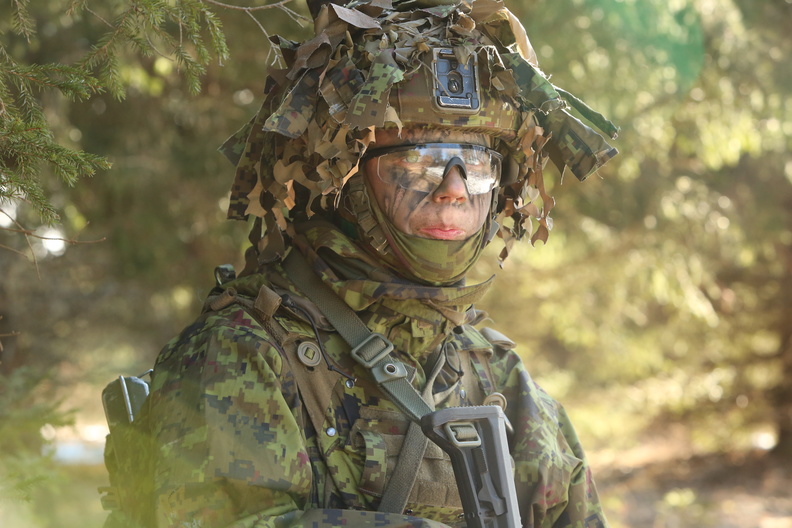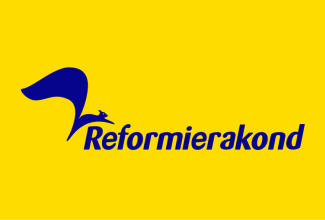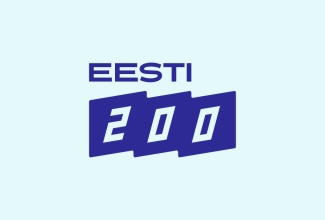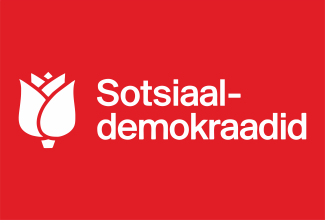An action plan for increased security
The Estonian Reform Party, the Social Democratic Party, and Eesti 200 will continue to work as a coalition government to ensure comprehensive security for Estonian people and businesses. The common goal of the three parties is to ensure Estonia’s security, direct the economy towards growth, reduce social and regional inequalities, and ensure the financial sustainability of the state.
The current coalition began cooperation when Russia’s war against Ukraine had been ongoing for more than a year. This war continues, and its effects have reached all of us. On the one hand, we have rightly increased defence spending at a record pace, but on the other hand, this war has had a long-term negative impact on our economy and on people’s sense of security and livelihoods.
Estonia’s competitiveness has decreased because energy and raw materials are more expensive, current supply chains are not functioning, and demand in our main export markets is stagnating. Changes in European monetary policy have raised loan interest rates and fear of war is reducing investment security. All of this is putting pressure on our national budget and increasing uncertainty about the future.
The coalition parties consider that the critical situation described above requires a well-functioning coalition government that can quickly take decisions that will bring about a solution and provide a long-term political perspective. By focusing on what matters most, we are able to give society enough confidence to ensure the growth of people’s economic well-being, to get the finances of the state in order, and thereby contribute to the development of all other spheres of life.
Security, Competitiveness, Decisiveness – these are the three criteria by which the work of the new government should be assessed.
Kristen Michal, 22 Jyly 2024
The three pillars of our sense of security
Protected Estonia
First, we will do everything to protect Estonia in every way and ensure a sense of security by increasing broad-based security investments and acquiring the necessary ammunition. This ensures that Estonia is a well-protected member state of NATO and the European Union, where it is safe to invest.
Growing economy
Second, we will create the conditions for the growth of the economy and well-being in general. We will invest in clean technologies and reduce bureaucratic obstacles to the establishment of innovative industrial enterprises in Estonia, as well as increase the competitiveness of small regions. We will also create preconditions for the increased defence costs to contribute to our economy through the faster development of the defence industry.
Balanced monetary policy
Third, we stand for the fact that a protected Estonia is based on a balanced monetary policy, because living beyond our means will one day limit our freedom of self-determination. The security tax must cover all the expenses required to increase Estonia’s defence capability and cope with other negative socio-economic effects of the war.
Increased competitiveness and reforms
In a difficult financial situation, the tasks and expenses of the state need to be reviewed and public administration must become more efficient. Estonia has excellent tools for this in the form of the digital state and data. Data-driven decision-making and the rapid development of artificial intelligence give us the opportunity to shape a personal state, reduce duplication, speed up communication with authorities, and thus save taxpayers’ money. Digital services of the state need to become more personalised and smart device-friendly, enable smarter cross-usage of data, and be sufficiently secure to withstand modern cyber threats.
Estonia’s economic development must also be felt outside its centres of attraction. When establishing and supporting new industrial enterprises, we keep in mind that competitive jobs should also be created outside the ‘golden circle’ municipalities. In addition, municipalities will have the opportunity to expand their revenue base in the form of local taxes and generate additional revenue from a local benefit instrument collected from the exploitation of regional natural and mineral resources.
The objectives and political challenges set out above require close cooperation between the three parties in a joint government. When making difficult domestic policy choices, it is important to speak openly and propose a concrete plan for eliminate the bottlenecks that have arisen in the development of the Estonian state. We need to find significant new tax revenues and cut excessive state spending to fix public finances and cover security costs. The current government coalition has a strong mandate from the Riigikogu to make difficult financial policy decisions and implement the necessary reforms together.
By providing smart governance, fostering innovation and modern technologies, harnessing the opportunities of our digital state, and paying attention to the needs of small regions, we can make Estonia a better place for everyone.
New investments and business confidence
- In order to achieve climate neutrality, we will adopt the Climate Resilient Economy Act, which will create a favourable investment environment for the construction of new clean industrial enterprises and the deployment of low-carbon technologies.
- We will continue with auctions for onshore wind power and organise auctions for offshore wind power and manageable capacities. To ensure security of supply, we will create the conditions for new manageable and storage capacities.
- We will identify priority areas of renewable energy based on existing and new developments. We will announce competitions for building permits for state-owned land, which will enable the construction of onshore wind farms on state land on an expedited basis.
- In order to encourage industrial investments, we will reduce the regulatory costs of electricity.
- We will create an instrument to facilitate the conclusion of direct electricity purchase agreements between large consumers and producers.
- We will develop electricity networks in advance to accelerate investments in new production. To this end, we will establish a regulation enabling the network to be developed in advance, which will ensure more predictable connection costs and shorten the time for connection to the network.
- We will complete the plan for the fourth electricity interconnection between Estonia and Latvia and start the plan for the third electricity interconnection between Estonia and Finland.
- We will take steps to increase national demand for biogas and hydrogen.
- The growth of defence investments must contribute to the Estonian economy, and to this end, we will conclude direct contracts with Estonian defence industry companies, launch a defence investment fund, and use localised procurements and counter-purchases, the principles of which are approved by the Government of the Republic.
- With national defence investments and permanent contracts, we will accelerate the development of the Estonian defence industry with the aim of increasing the turnover of the defence industry to EUR 1 billion by 2030.
- We will support cooperation between Estonian and Ukrainian defence companies and the use of Ukraine’s experience as a reference for increasing the export capacity of the Estonian defence industry.
- In supporting Ukraine militarily, we will proceed from the military needs of Ukraine and the Estonian Defence Forces and the desire to accelerate the development of the Estonian defence industry. In order to achieve this goal, we will direct as much of the volume of aid intended for Ukraine as possible into orders of the Estonian defence industry.
- We will accelerate the development of the defence industrial park to ensure suitable conditions for product development for Estonian defence industry companies.
- We will proceed from the principle that the local defence industry is part of our broad-based national defence capability and therefore, we will use the principle of localisation in conducting defence procurements, among other things, aiming at transferring technology and bringing part of the production of the defence industry to Estonia with the aim of developing the domestic defence industry and ensuring security of supply.
- We will increase the volume of support for the development of the defence industry and the creation of a future defence capability task force.
- We will create an internationally attractive package for attracting large-scale investments to Estonia, the aim of which is, among other things, to increase regional competitiveness.
- We will reform the way plans are carried out and activity licences are issued so that new investments do not get stuck in bureaucracy.
To do this, we will implement the following changes:
- We will significantly shorten the time it takes to plan for carrying out plans.
- In cooperation with local governments, we will create priority development areas for new industries where the necessary infrastructure will be developed and where all the necessary activity licences can be obtained on an accelerated basis.
- By ensuring environmental compliance, we will reform the environmental impact assessment system with the aim of significantly shortening the assessment process.
- To speed up the process, we will reduce the number of activity licences and simplify the issuing of permits and registrations.
- When using Estonian natural and mineral resources, we will proceed from their smart valorisation and the circular use of materials. For public buildings and investments, we will prefer the use of materials and wood from the circular economy.
- We will create a local benefit instrument in the extraction and exploitation of any mineral resources.
- We will decide on the use of critical natural and mineral resources in a public consultation with the parliament, valuing broad societal benefits, opportunities for production and development with higher added value in Estonia, and a green mindset.
- We will increase our ability to attract foreign investments to Estonia and ensure that the interests of our companies are better served in key target markets. To do this, we will update the value proposition for investing in Estonia and ensure better-focused export support for our companies.
- We will empower the culture and sports sector in contributing to the development of the Estonian economy through major international projects and events.
Modern governance and an effective state
- We will organise the upper secondary education school network and its organisation on the level of an act.
- We will implement a reform of vocational education to ensure that vocational education is a more important and attractive choice for basic school graduates. Vocational schools also need to increase their capacity to provide quality upper secondary education.
- To ensure the quality of vocational education and to meet the needs of the labour market, we will create a joint operating model with the Estonian Unemployment Insurance Fund. We will focus on orders for the acquisition of skills and qualifications for the training activities of the Estonian Unemployment Insurance Fund and organise the teaching of Estonian to adults more effectively than before.
- We will develop an Estonian talent policy and a strategy for the availability of skilled labour. We will make the involvement of skilled labour more flexible and faster in cooperation with social partners.
- In addition to free higher education, we will also give universities the opportunity to charge tuition fees in Estonian-language curricula in certain cases, and we aim to increase study opportunities in professional higher education.
- Giving value to health data and the potential of personalised medicine must be used more extensively in research, business, and the provision of health care services.
- We will bring the digital solutions of the medical system to a common platform to reduce duplication and improve access to health care and social services.
- Together with the labour market actors and social partners, we will look for ways to organise the issues concerning sickness benefits and vocational education more effectively.
- Together with the representative organisations of social partners and stakeholders, we aim to create a coherent support system for people with reduced capacity for work.
- We will agree on a sustainable health care financing model. 11. We will legitimise the end-of-life declaration of intent.
- We will amend the Public Procurement Act, allowing more consideration to be given to the principle of locality and the environmental footprint, encouraging innovation, and taking more account of potential security risks when conducting procurements.
- We will reduce regulation and introduce the rule that any new requirement that imposes an administrative burden on businesses will require one of the existing requirements to be repealed.
- We will reduce reporting obligations and controls for small and medium-sized enterprises.
- We will make the state more efficient by reviewing the tasks of the public sector and eliminating duplicate activities.
- We will improve the strategic management of the state and the capabilities of the Government Office in supporting the work of the Government of the Republic.
- In order to improve the quality of state administration, we will prioritise data-based decision-making, the use of artificial intelligence, and the automation of dealings with the state.
- We will continue to digitalise court proceedings and look for ways to speed up court proceedings using artificial intelligence.
- In order to develop data- and needs-based (personal state) services, we will streamline state databases and ensure their cross-use.
- We will further develop e-government services, make them more mobile-accessible, and increase their reliability and cyber security. We will develop a comprehensive map of our technological capabilities to continue functioning as a cohesive digital state in every crisis.
- We will make the management of state-owned enterprises and foundations more efficient and formulate clearer owner expectations.
- We will provide the State Electoral Office with an additional resource for the implementation of i-voting and m-voting and for ensuring the general security of elections.
- We will give 16-year-old citizens the right to vote in European Parliament elections.
- We will initiate a practice that a new minister will be heard beforehand by the respective committee of the Riigikogu to get an overview of their political views and sectoral plans. We will also initiate a debate before the plenary sitting of the Riigikogu to create such a hearing.
- When transposing EU law, we will set out alternatives when specifying the rules.
- We will expand the possibilities of local governments to increase their revenue base and create solutions that will enable local governments to benefit more from regional business activities.
- We will continue to create regional development areas and conclude development agreements.
- We will prefer the establishment of new industrial enterprises outside major centres of attraction to increase the competitiveness of all Estonian regions.
- We will launch a programme to promote the creation of homes, under which:
- We will continue the rental housing programme for the construction of new rental houses.
- We will review the conditions of the measures of the Rural Development Foundation and KredEx to help people acquire a home in areas of market failure.
- Where necessary, we will complement the rights of municipalities to cooperate with the private sector in the provision of rental apartments.
- We will accelerate the renovation of residential buildings in rural areas.
- We will end unfair competition in short-term rentals by reducing tax evasion.
- We will develop a housing policy strategy.
- We will accelerate the construction of Rail Baltica and continue with investments to electrify the railway and increase speeds. We will intensify the train service in connection with the arrival of new trains.
- We will invest in the development of clean public transport.
Proper public finances
- The state budget must be clear and transparent. In the explanatory memorandum to the state budget for 2025, we will start publishing a budget based on cost accounting in parallel with the activity-based budget. We will then decide on the need to continue with an activity-based budget and on changes to the budgeting process.
- We will bring the basic State Budget Act in line with the renewed European Union fiscal policy rules.
- Proper public finances are an important part of a sound business environment and ensure lower interest rates for both the state and companies. We will reduce the budget deficit in 2025 from the projected 5.6% of the GDP to 3% of the GDP.
- We will keep the deficit below 3% also in 2026 and reduce it in 2027, taking into account that the state budget must provide funds for increased security investments.
- We will enforce the abolition of the so-called ‘tax hump’ and the increase of the basic exemption to 700 euros in 2026.
- To keep budget expenditure under control, we will cut labour and management costs as well as operational and targeted subsidies by 10% over 3 years: 5% in 2025, 3% in 2026, and 2% in 2027. Cost savings include not only public authorities, but also foundations and state-owned enterprises.
- We will reduce the number of jobs in central government, including foundations, state-owned companies, and agencies.
- In order to improve the budgetary situation, we will increase the excise duty on alcohol, tobacco, and petrol by an additional 5% per year. We will monitor the effects of border trade and, if necessary, adjust the excise duty growth plans.
- In order to ensure the sustainability of government expenditure, we will review the loan limits and fiscal rules for foundations and local governments.
- We will analyse social benefits and decide which ones will become needs-based.
- We will establish a security tax until 31 December 2028, which we will direct for the development of Estonia’s defence capabilities and security investments. The need for further changes or amendments to the tax will be decided by the government that takes office after the 2027 Riigikogu elections. The security tax will consist of three parts:
- 2% of turnover from 1 July 2025,
- 2% on personal income from 1 January 2026,
- 2% of companies’ profits from 1 January 2026.
Foreign policy and strengthening Estonia’s security
- Estonia will strengthen its ties with democratic countries and societies around the world to resist attempts by authoritarian regimes to disrupt the world order based on international law and universal human rights.
- Russia’s attack on Ukraine is an existential threat to the security of Estonia and the whole of Europe. Restoring lasting peace in Europe will only be possible with the strategic defeat of Russia as an aggressor.
- We are working to ensure Ukraine’s victory, based on the principle that the international order must be based on the principles of territorial integrity and sovereignty.
- Estonia supports the enlargement process of NATO and the European Union based on shared values and principles.
- We will call on NATO allies to increase defence spending to a minimum of 2.5% of the GDP and to ensure that the military capabilities of allies comply with NATO’s defence plans.
- We will develop broad cooperation with the US and work to make the European Union and the US strategic partners.
- The European Union and NATO must act decisively to ensure European security and counter Russian aggression and hybrid threats from Russia.
- We will attach great importance to cooperation with the Nordic and Baltic countries and are looking for new opportunities for security-related cooperation. The accession of Finland and Sweden to NATO will enable security cooperation along the Baltic Sea to be taken to a new level.
- Estonia will continue to provide military aid to Ukraine in the amount of 0.25% of the GDP at least until 2027.
- Estonia contributes to the reconstruction of Ukraine and to providing any other assistance, creating opportunities for Estonian businesses.
- Estonia supports Ukraine’s accession to the European Union and NATO.
- We are calling for sanctions against Russia to be tightened and for the circumvention of sanctions to be prevented.
- We are working to ensure that frozen Russia’s frozen assets are channelled as much as possible and as soon as possible to support Ukraine.
- We support the independent work of the International Court of Justice and the International Criminal Court in investigating war crimes committed in Ukraine. The Russian leaders who initiated the war against Ukraine must be held accountable and an international tribunal must be set up for this purpose.
- We will work together on reforming the UN so that Russia as a member of the Security Council carrying out aggression cannot hinder the functioning of the UN.
- Due to the changed security situation and based on the principle of active defence, we will renew the bases of Estonia’s security policy in 2025.
- In order to develop our military capabilities in a comprehensive manner, we will continue to prepare long-term defence plans together with our allies, based on the threat assessment and the military advice of the Chief of the Estonian Defence Forces.
- We will ensure national defence expenditure in the amount of at least 3% of the GDP, to which the hosting costs of allies will be added.
- We will implement an additional national defence and comprehensive security investment programme, the focus of which will be determined under the direction of the Government Office in cooperation with the Defence Forces and the authorities responsible for internal security.
- With additional defence investments, we will acquire long-range weapons systems and the necessary ammunition to destroy, if necessary, a threat to the security of Estonia on enemy territory.
- In order to strengthen Estonia’s military defence, we consider it necessary to take the following steps:
- In order to empower the ground forces, we will strengthen the Estonian division, including by continuing to integrate allied units, including the UK brigade, significantly strengthening the division’s indirect fire capability, and ensuring adequate ammunition.
- At sea, together with our allies, we will achieve the ability to keep the Baltic Sea clear of hostilities by increasing our maritime situational awareness.
- To protect the airspace, we will develop Estonia’s multi-layered air defence, integrating it with the NATO air defence model. We will pay particular attention to the dangers posed by drones.
- To strengthen our defence capabilities, we will establish a Baltic defence zone with Latvia and Lithuania, building the necessary defence infrastructure on the border and aligning it with the corresponding activities of Poland.
- The development of the training areas of the Defence Forces and the infrastructure necessary for hosting allies is a key element of independent defence capability and the integration of allied forces.
- To counter hybrid threats and the spread of misinformation, we will strengthen Estonia’s information, media, and digital space, increase digital defence capabilities and the cyber defence capacity of our e-state.
- To strengthen internal security, we are taking the following steps:
- To protect the eastern border and manage mass unrest, we will create a Police and Border Guard Board crisis reserve consisting of reservists.
- We will strengthen the capacity of the government sector, and in particular internal security institutions, to counter hybrid threats.
- We will complete the construction of the land border and start setting up the drone wall. d. We will reinforce the Police and Border Guard Board’s armaments on the eastern border.
- Building on the experience of the war in Ukraine, we are contributing to building society’s capacity for crisis preparedness by providing crisis awareness contact training and expanding individual opportunities to contribute to security.
- We will improve the continuous operation of healthcare institutions and increase stocks. g. We will strengthen our civil protection and large-scale evacuation capabilities.
- To manage crises more clearly and quickly, we will adopt the Civil Crisis and National Defence Act.
Areas of responsibility of the coalition
Estonian Reform Party:
prime minister, minister of finance, minister of climate, minister of defence, minister of social protection, minister of culture, minister of economic affairs, first vice-president of the Riigikogu, chairman of the Finance Committee, chairman of the Foreign Affairs Committee, chairman of the Social Affairs Committee, chairman of the Rural Affairs Committee, chairman of the Security Authorities Surveillance Select Committee, vice-chairman of the Anti-Corruption Select Committee, vice-chairman of the State Budget Control Select Committee.
Eesti 200:
president of the Riigikogu, minister of education and research, minister of justice, minister of foreign affairs, chairman of the Constitutional Committee, chairman of the Environment Committee, chairman of the European Union Affairs Committee, chairman of the National Defence Committee.
Social Democratic Party:
minister of the interior, minister of regional affairs, minister of infrastructure, minister of health, chairman of the Economic Affairs Committee, chairman of the Legal Affairs Committee, chairman of the Cultural Affairs Committee.
Last updated: 27.03.2025

